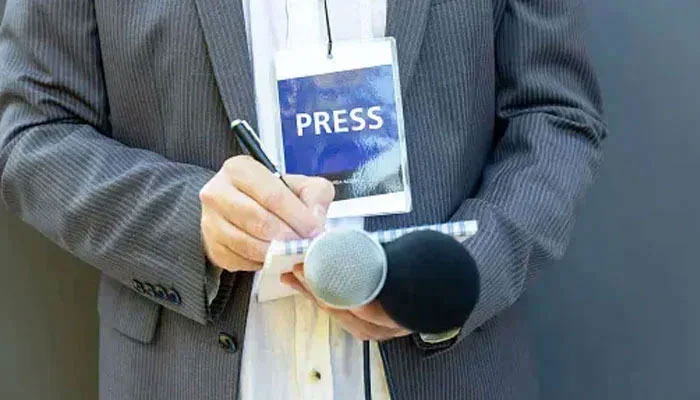Freedom, anyone?
Sobering though unsurprising, report reads more like an indictment than an analysis
The Council of Pakistan Newspaper Editors (CPNE) has released its annual report on media freedom for 2024–25, and it paints a rather grim picture of the state of press freedom in the country. Sobering though unsurprising, the report reads more like an indictment than an analysis. With seven journalists killed in connection with their work in just one year, the message is clear: journalism in Pakistan is a dangerous profession under sustained assault from multiple fronts. According to the CPNE, the Pakistani state continues to either enable or orchestrate the steady constriction of media space – using a well-worn toolkit of coercion, legal intimidation and legislative overreach. Recent laws such as the Prevention of Electronic Crimes Act (Peca) 2025 and the Punjab Defamation Law 2024, framed as regulatory and protective measures, have instead become blunt instruments of repression. Their true purpose is not to safeguard the public good, but to shield the powerful from scrutiny – a point the CPNE rightly describes as “authoritarianism disguised as democracy". Media channels are taken off air without explanation. Newspapers are blocked from distribution. Journalists face abductions, threats and exile. These are all symptoms of a broader system that views freedom of expression not as a democratic necessity, but as a threat to be neutralised. In such an environment, self-censorship is basic survival mechanism.
Equally troubling is the normalisation of coordinated disinformation campaigns and online harassment of journalists. These tactics, once pioneered by a particular political party during its time in power, have now been adopted across the political spectrum. The pattern is clear: authoritarian tools, once introduced, do not vanish with a change in government. They are inherited, sharpened, redeployed. This is the tragic cycle of repression that no party has shown the courage to break. And the lesson is obvious – the tools you use to silence critics today will one day be turned against you. If our political leaders are sincere about their commitment to democracy, they must repeal or amend laws like Peca and the Punjab defamation bill through transparent, consultative processes that include journalists, civil society and legal experts. It is no longer enough to issue empty statements about the sanctity of press freedom. Legal protections, institutional independence, and above all, political will are what journalists in Pakistan truly need.
To be clear, this is not a defence of all that ails Pakistani media. Our press has its share of sensationalism, partisanship, and ethical lapses. But censorship is not the remedy for bad journalism – better journalism is. The solution lies in media literacy, stronger ethical standards, fair and impartial defamation laws and independent regulatory bodies. The instinct to silence rather than engage with criticism is just a very tragic failure of imagination. A democracy cannot thrive in an atmosphere where dissent is criminalized, facts are feared, and journalism is treated as sedition. And yet, despite everything, the resilience of Pakistan’s journalists offers hope. During the recent Indo-Pak conflict, even under pressure and with limited freedom, our media largely resisted the temptation of jingoism and maintained professional integrity – in sharp contrast to the hyper-nationalism seen across the border. Imagine what Pakistan’s media could achieve if it were truly free. The real question now is not whether press freedom is important. That debate has long been settled. The real question is: can our political and state institutions tolerate it? Because history has shown, again and again, that censorship ultimately harms everyone.
-
 Funeral Home Owner Sentenced To 40 Years For Selling Corpses, Faking Ashes
Funeral Home Owner Sentenced To 40 Years For Selling Corpses, Faking Ashes -
 Why Is Thor Portrayed Differently In Marvel Movies?
Why Is Thor Portrayed Differently In Marvel Movies? -
 Dutch Seismologist Hints At 'surprise’ Quake In Coming Days
Dutch Seismologist Hints At 'surprise’ Quake In Coming Days -
 Australia’s Liberal-National Coalition Reunites After Brief Split Over Hate Laws
Australia’s Liberal-National Coalition Reunites After Brief Split Over Hate Laws -
 DC Director Gives Hopeful Message As Questions Raised Over 'Blue Beetle's Future
DC Director Gives Hopeful Message As Questions Raised Over 'Blue Beetle's Future -
 King Charles New Plans For Andrew In Norfolk Exposed
King Charles New Plans For Andrew In Norfolk Exposed -
 What You Need To Know About Ischemic Stroke
What You Need To Know About Ischemic Stroke -
 Shocking Reason Behind Type 2 Diabetes Revealed By Scientists
Shocking Reason Behind Type 2 Diabetes Revealed By Scientists -
 SpaceX Cleared For NASA Crew-12 Launch After Falcon 9 Review
SpaceX Cleared For NASA Crew-12 Launch After Falcon 9 Review -
 Meghan Markle Gives Old Hollywood Vibes In New Photos At Glitzy Event
Meghan Markle Gives Old Hollywood Vibes In New Photos At Glitzy Event -
 Simple 'finger Test' Unveils Lung Cancer Diagnosis
Simple 'finger Test' Unveils Lung Cancer Diagnosis -
 Groundbreaking Treatment For Sepsis Emerges In New Study
Groundbreaking Treatment For Sepsis Emerges In New Study -
 Roblox Blocked In Egypt Sparks Debate Over Child Safety And Digital Access
Roblox Blocked In Egypt Sparks Debate Over Child Safety And Digital Access -
 Savannah Guthrie Addresses Ransom Demands Made By Her Mother Nancy's Kidnappers
Savannah Guthrie Addresses Ransom Demands Made By Her Mother Nancy's Kidnappers -
 OpenAI Reportedly Working On AI-powered Earbuds As First Hardware Product
OpenAI Reportedly Working On AI-powered Earbuds As First Hardware Product -
 Andrew, Sarah Ferguson Refuse King Charles Request: 'Raising Eyebrows Inside Palace'
Andrew, Sarah Ferguson Refuse King Charles Request: 'Raising Eyebrows Inside Palace'




